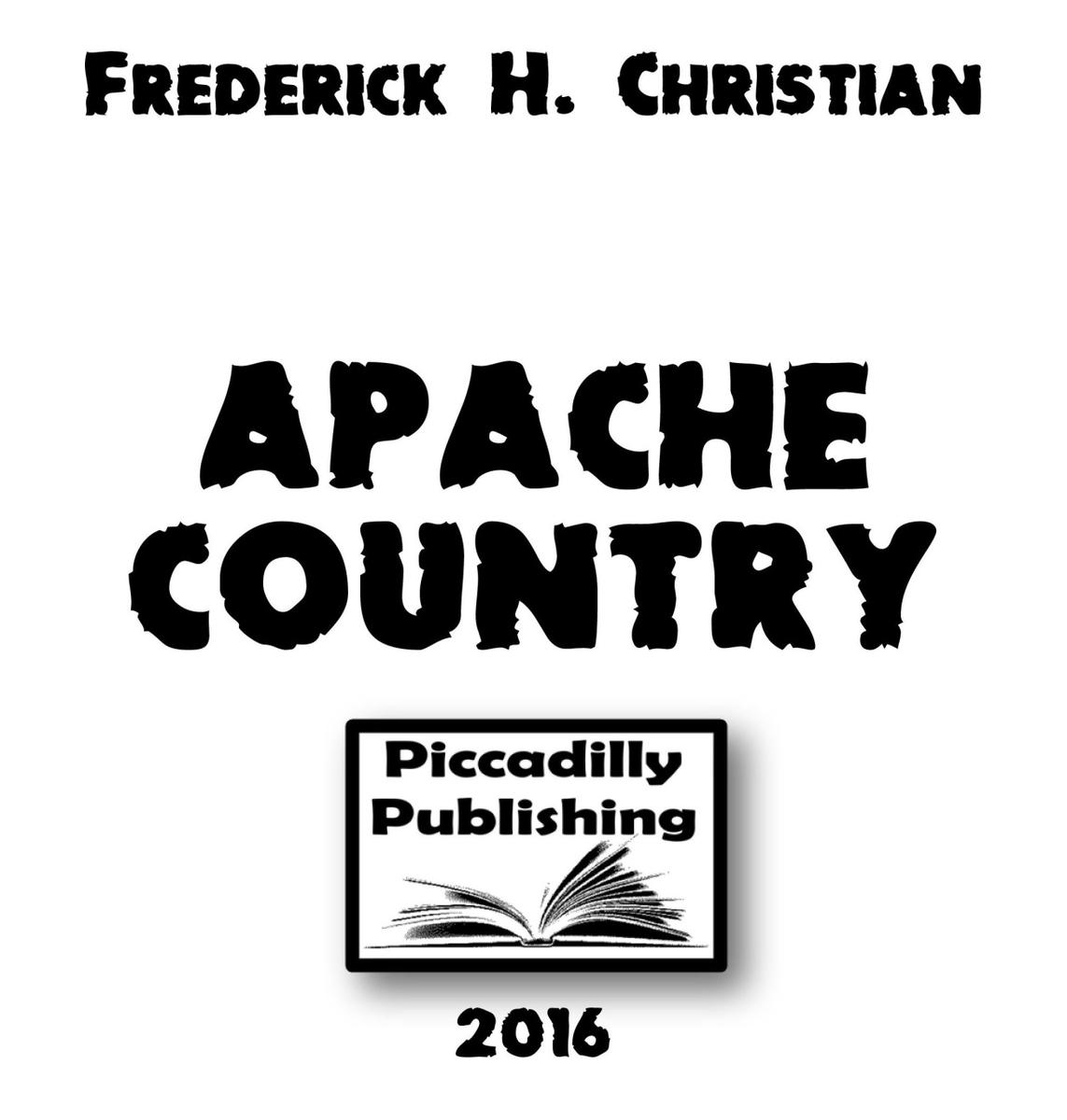Apache Country
Authors: Frederick H. Christian
Tags: #crime genre, #frederick h christian, #frederick nolan, #apache country, #best crime ebook online, #crime fiction online, #crime thriller ebook



Riverside New Mexico police wanted to pin a
murder rap on James Ironheel. He was captured near the scene of a
double murder, so it seemed a slam-dunk case. But law officer David
Easton had his doubts. When Ironheel’s lawyer is murdered, and his
transfer to a safe-house is compromised it seems Easton’s doubts
were justified.
Now they are being both hunted and whoever is
hunting them down wants them out of the way – permanently.
Apache Country is more than a chase thriller
it’s a story filled with love, death, hope and hatred.

APACHE COUNTRY
By Frederick H. Christian
Copyright
©
2016 by
Frederick H.
Christian
First Smashwords Edition: May 2016
Names, characters and incidents in this book
are fictional, and any resemblance to actual events, locales,
organizations, or persons living or dead is purely
coincidental.
All rights reserved. No part of this book may
be reproduced or transmitted in any form or by any means,
electronic or mechanical, including photocopying, recording or by
any information or storage and retrieval system, without the
written permission of the author, except where permitted by
law.
This is a Piccadilly Publishing Book
Editor: Mike Stotter
Published by Arrangement with the Author.
Even this early it was hot.
Tuesday was the sheriff’s day off, so chief
deputy Dave Easton got to his desk well before eight.
He
said hello to DeAnn, the duty
receptionist, then spooned some Arbuckles into the coffee machine.
As it brewed he went through the mail and the usual batch of
reports on crimes committed and arrests made overnight, e-mails
from other law-enforcement agencies, and a sheaf of wanted notices
and missing person inquiries. Routine.
Then at eight twenty-two Bert Bonnell’s call
came in.
Up on Garcia Flat, north of town, rancher
Bonnell had seen buzzards circling over an arroyo. Figuring maybe
one of his cows had dropped a stillborn calf, he drove over to
check. About a mile up the arroyo, he came upon a black Lexus
slewed over to one side of the trail with both its front doors wide
open. Near it, face down in a blackened pool of blood, lay the body
of a man, a cloud of flies buzzing around the bloody mess of brain
and bone that had been his head.
A grizzled fifty-eight year-old, Bonnell had
seen enough TV cop shows to know not to touch anything. He used his
cellphone to call the Sheriff’s Office in Riverside. The dispatcher
told him a squad car with two officers would be out there in twenty
minutes, and it was.
At
9:41 precisely DeAnn patched through Steve Jorgensen, one of the
two responding officers.
“Steve,” Easton said. “What you got?”
“Bad one, Dave,” Jorgensen said. His voice
was shaky. “We got a double murder out here. Robert Casey. And his
grandson. Adam.”
Easton’s mind raced. In a small town like
Riverside, murder was a word you didn’t hear often. Especially when
the victims were one of the State’s most wealthy and prominent
businessman and his eleven-year-old grandson. It would hit the
community like a smart bomb, unexpected, devastating.
“Bonnell said there was only one body.”
“I know. But when we got out there, we saw
buzzards further up the arroyo. Took a look and found the boy.
Someone cut his throat ear to ear. Carmody’s still puking.”
“What’s your exact location?”
“About a mile north of Garcia Flat,”
Jorgensen said. “Not far from Arroyo del Macho.”
Easton unrolled the map in his head. Garcia
Flat was about ten miles north of town, maybe two or three miles
off the highway. Arroyo del Macho was a sometime watercourse
running toward the Pecos River from the Marcial Mountains sixty
miles west. Sudden country, they called it, flat prairie that broke
up into desolate gullies. You could hide an army out there and it
would be invisible. As the US Cavalry had learned from the Apache
about a century ago.
What in the hell would Robert Casey be doing
at Garcia Flat, out there in the middle of nowhere? he
wondered.
“Beats me,” Jorgensen said, and Easton
realized he had spoken his thoughts out loud.
“You’re sure it’s Casey?” he asked.
“ID was in the Lexus,” Jorgensen said. “Kid’s
name was on his school stuff. Found him behind some big rocks about
a hundred, hundred fifty yards from the old man. You wanna make a
guess what the fuck this is, Dave?”
Easton didn’t reply. Like most southwestern
towns, Riverside got its share of fatal violence, but this kind of
butchery was way off the scale and Jorgensen didn’t know how to
react. Hell, he thought, neither do I. Especially when one of the
victims was someone you loathed and the other might have been your
son.
“CSI’s already on its way,” he said. “I’m
leaving now. I’ll pick up the sheriff, should
be
with you in, what, twenty minutes
max.”
“Bring a sick bag,” Jorgensen said
flatly.
Easton stood up, put on his gray Stetson and
headed for the door.
“Call Joe,” he told DeAnn. “Tell him I’ll
pick him up in five minutes. And why.”
Outside it was already summertime hot; he got
into his Jeep Cherokee, flipped on the strobe and headed out.
Sheriff Joe Apodaca lived over on Lea Avenue
in a rambling turn-of-the-century beauty with a pecan tree in the
backyard. He was already waiting on the curb, a fit and capable man
in his middle fifties, built like a jockey, tough as whipcord. The
beat cops called him Vinegar Joe and the name fit: if knowing he
wasn’t everyone’s cupcake ever bothered him, he kept it pretty well
hidden. In Easton’s book he did what the guy wearing the star is
supposed to do: he got results.
“Hit the siren,” he said urgently as he got
in. “Move.”
The lack of ceremony didn’t bother Easton. In
all the years they had worked together he had never heard Joe fancy
up anything he had to say, or use two sentences when one would do
the job. It made for a certain tension sometimes. You’d be waiting
for him to elaborate and he was already through talking.
Lights on, siren whooping, they roared over
the Spring River Bridge on to Main and headed north, traffic
parting in front of the Jeep like porpoises evading a shark. After
the junction with US-70, the siren became superfluous and Easton
tramped down on the loud pedal, pushing the needle up into the
seventies. The road ran as straight as a ruled line, pale gray-blue
in the heat. Off to the west, huge alto-cumulus formations sailed
in line astern across the Marcial Mountains.
Apodaca listened intently as Easton told him
what he knew, his weather-beaten face thoughtful. When Easton got
through talking he took off his hat and ran a hand through his
hair, iron-gray and as close-cropped as an Army drill instructor.
Easton waited, wondering what he was thinking.
“How’s this hitting you, Dave?” Apodaca
asked.
That again, Easton thought.
Riverside was a small town. Everyone knew
everyone. Word got around, no matter how tight the lid was screwed
down. It was like a label stuck on him. To certain people he would
always be the guy who’d wanted to marry Robert Casey’s daughter and
got bounced.
“You informed the family?” Apodaca asked.
“Just the basics. I thought you might want to
call them later. When we know exactly what happened.”
“Thing like this just doesn’t make sense,”
Joe muttered, more to himself than Easton.
Never does, Easton thought. Murder is the
answer to a question nobody dares to ask.
Up ahead he saw a patrol car parked beside
the highway, dome lights flashing palely. A deputy waved them
toward a taped-off track snaking east through the mesquite and
sagebrush. It was like driving on a washboard. The boulder-strewn
arroyo opened up in front of them, as incongruous as a movie set
with its yellow-taped cordon and scatter of vans, the occasional
squawks of police radios, the pale flicker of flashguns,
white-coated technicians going about their work.
Out of the Jeep, the heat hit them like a
blanket. Steve Jorgensen came over to meet them. The first officer
to arrive at a crime scene automatically became investigating
officer, I/O in cop-speak. His first priority was to maintain its
integrity.
A big, burly, blond guy who looked like
exactly what he was, a former college football player in a cop’s
uniform, Jorgensen logged them in and gave them clear plastic
gloves and over-shoes provided by CSI.
“OK,” Apodaca said. “Let’s do it.”
He led the way over to the clear plastic
isolator cube the CSI techies had erected. Robert Casey’s body lay
face down, a brownish bloodstain the size of a dinner plate beneath
his face, the contours of his skull distorted by the impact of the
bullet that had killed him. He had on a tan colored windbreaker and
tan pants, one knee drawn up, one foot turned unnaturally inward,
accentuating his deadness.
The techies in the tent didn’t even look up
to acknowledge their presence. Nearby, other technicians using
tweezers were meticulously retrieving and bagging the brain and
bone fragments that had exploded through his forehead and
splattered the scrub and sand.
Easton stood looking down at the body,
remembering.
“Kit tells me you asked her to marry you.
That right?”
“Yes, sir. With your consent, of course.”
An impatient shake of the head. “It’s not
going to happen.”
“Sir?”
“Don’t act surprised. You know what I’m
talking about.”
“No, sir, I don’t.”
“Then I’ll spell it out for you.” His voice
was harsh. “No daughter of mine is going to marry a Mexican.
¿Comprende?”
All those years ago, yet he could still hear
the loathing in Casey’s voice, unexpected as dogshit on the
breakfast table. He remembered how angry with himself he’d been for
not having seen it coming. It was there in Casey’s politics, the
people his donations went to, the far-right speeches he made. Eaton
had made the mistake of believing himself past the race barrier,
his path clear: run for sheriff, then maybe DA, marry Kit Casey and
ride off into the sunset. Then in those few hating seconds, Robert
Casey had torn it all apart and probably never gave much of a
damn.
Tough, charismatic, handsome, a perfectly
polished one hundred percent stainless steel bastard, Robert Adam
Casey had been as big a fish as fish got in the Southwest. The son
of a prominent New York banker, he had come to Riverside during
World War Two, getting himself started in the oil refining business
just in time to make a fortune supplying high-octane fuel to the US
Army Air Force bases in the area. Diversifying first into ranching
and stock breeding, then masterminding the development of his
Mescalero Corporation, now one of the country’s largest players in
waste management. Casey always said the rules of his business were
simple: the more disgusting the garbage, the more they would pay
you to haul it away.